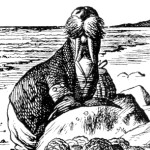 It’s the birthday of the world’s foremost Hillbilly Thomist, Flannery O’Connor. She’d have been 88 today had she not been taken from us, all untimely-like. In honor of the occasion, here’s a recording of Miss O’Connor reading a somewhat-truncated version of her own essay, “Some Aspects of the Grotesque in Southern Fiction” — a piece that, when paired with “The Church and the Fiction Writer,” has made her more explicable to me than anything I’ve read (other than her stories themselves).
It’s the birthday of the world’s foremost Hillbilly Thomist, Flannery O’Connor. She’d have been 88 today had she not been taken from us, all untimely-like. In honor of the occasion, here’s a recording of Miss O’Connor reading a somewhat-truncated version of her own essay, “Some Aspects of the Grotesque in Southern Fiction” — a piece that, when paired with “The Church and the Fiction Writer,” has made her more explicable to me than anything I’ve read (other than her stories themselves).
If you’re interested in the essay’s full, undiluted effect, however, you must read it. This recorded version is oddly-like-yet-simultaneously-unlike the original essay, and cuts out rather suddenly. (It also leaves out my favorite paragraph.) Still, the charm of this particular gem is not so much its content as it is the opportunity to hear Miss O’Connor speaking in her charmingly soft, Southern way.
[audio:http://wp.patheos.com.s3.amazonaws.com/blogs/summathissummathat/files/2013/03/some_aspects_of_the_grotesque_in_southern_literature.mp3]When we look at a good deal of serious modern fiction, and particularly Southern fiction, we find this quality about it that is generally described, in a pejorative sense, as grotesque. Of course, I have found that anything that comes out of the South is going to be called grotesque by the Northern reader, unless it is grotesque, in which case it is going to be called realistic.
A whole host of HT’s: Erika Rudzis, whose Tweet first reminded me that it was Miss O’Connor’s birthday; BavaTuesdays, the source of the essay clip itself; and OpenCulture, for putting everything together in one comprehensive post. Attribution(s): “Flannery O’Connor” is derived from “Robie with Flannery, 1947” and licensed under CC BY-SA 3.0 via Wikimedia Commons; “Flannery’s Favorite Bird” provided by Shutterstock.
















